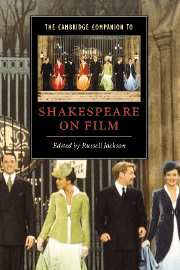Book contents
- Frontmatter
- Introduction
- PART 1 ADAPTATION AND ITS CONTEXTS
- PART 2 GENRES AND PLAYS
- PART 3 DIRECTORS
- PART 4 CRITICAL ISSUES
- 14 Looking at Shakespeare's women on film
- 15 National and racial stereotypes in Shakespeare films
- 16 Shakespeare the illusionist
- 17 Shakespeare's cinematic offshoots
- Further reading
- Filmography
- Index
17 - Shakespeare's cinematic offshoots
from PART 4 - CRITICAL ISSUES
Published online by Cambridge University Press: 28 May 2006
- Frontmatter
- Introduction
- PART 1 ADAPTATION AND ITS CONTEXTS
- PART 2 GENRES AND PLAYS
- PART 3 DIRECTORS
- PART 4 CRITICAL ISSUES
- 14 Looking at Shakespeare's women on film
- 15 National and racial stereotypes in Shakespeare films
- 16 Shakespeare the illusionist
- 17 Shakespeare's cinematic offshoots
- Further reading
- Filmography
- Index
Summary
In 1911 the British trade press welcomed the Danish silent film Desdemona, where a jealous modern actor murders his wife on-stage during a performance of Othello. The producers were congratulated for understanding the public, for providing not 'unadulterated Shakespeare' but 'a good modern play with a plot not too deep but just deep enough for mental exercise without effort, while interest and excitement are sustained throughout'. There were 'countless hordes to whom the Bard's plays do not appeal in the remotest degree', but making a film 'so to speak, around the tragedy of Othello' should suit and satisfy and perhaps improve this mass audience. There were many such modernisations and adaptations in the silent era - Asta Nielsen's cross-dressed Hamlet, perhaps the greatest silent Shakespeare film, plays fast and loose with the original - and when in the late 1930s Warner Brothers' A Midsummer Night's Dream, MGM's Romeo and Juliet and in England Twentieth Century Fox's As You Like It were all critical and commercial failures and the studios abruptly lost faith in the plays' boxoffice potential, screen Shakespeare did not simply disappear. Just as 'Shakespeare' permeates our culture iconographically from cheque cards to cigars, so in mainstream film culture the plays have functioned as myths and sources; they materialise repeatedly and often unnoticed on cinema screens through allusions and variations, remakes, adaptations and parodies. In this broader, culturally important, sense 'Shakespearean film' is not only populated by Olivier, Welles, Branagh and company - Jean-Luc Godard, Jean-Paul Sartre and James T. Kirk are also there, alongside Cole Porter, Katherine Hepburn, Arnold Schwarzenegger, Mel Brooks and Sid James. Here we can only point to a vast terrain of cinematic appropriation, and suggest some historical implications of 'free' Shakespearean film.
- Type
- Chapter
- Information
- The Cambridge Companion to Shakespeare on Film , pp. 295 - 313Publisher: Cambridge University PressPrint publication year: 2000
- 2
- Cited by



